Use a beneficial savings structure
Investing money is often seen as a risky thing to do even though it is generally understood to be necessary. For example, those receiving pension income would not be in the same position if the companies paying the income had left all of the pension contributions in a current account or in a box under the bed.
Reducing Spanish tax
By John Hayward
This article is published on: 27th June 2023

Financial markets can be volatile (always, I hear you shout). We fully appreciate this. We also acknowledge that inflation has created higher interest rates. Better news if you are a saver but not so pleasant for mortgage payers, or parents having to help their children pay off increased debt.
Let us imagine that, for the foreseeable future, we have high inflation accompanied by higher interest rates. Using an amount of £500,000, I have compared depositing in a savings account with investing in a Spanish compliant investment bond and I have used an interest/growth rate of 4%. I have based my comparison on the bond paying growth to the bondholder’s bank account and using GBP as I cannot see any Euro accounts paying 4%.
– £500,000 at 4% = £20,000
– Using an exchange rate of 1.16 £/€,
– £20,000 = €23,200
The deposit account interest is taxed in full and, at current 2023 rates, is €4,752 each year. This has to be declared in the annual tax return.
The Spanish compliant bond attracts tax on the gain within the withdrawal. I have based the calculation on the same amount being withdrawn i.e., €23,200. In the first year, the taxable gain within this is only €892 and the corresponding tax is €170. The taxable amount within the bond income increases over time but, over 10 years, the tax is:
– €47,520* on the deposit account interest
– €8,381* on the bond income
This gives a tax saving of over €39,000 over 10 years by using the Spanish compliant bond.
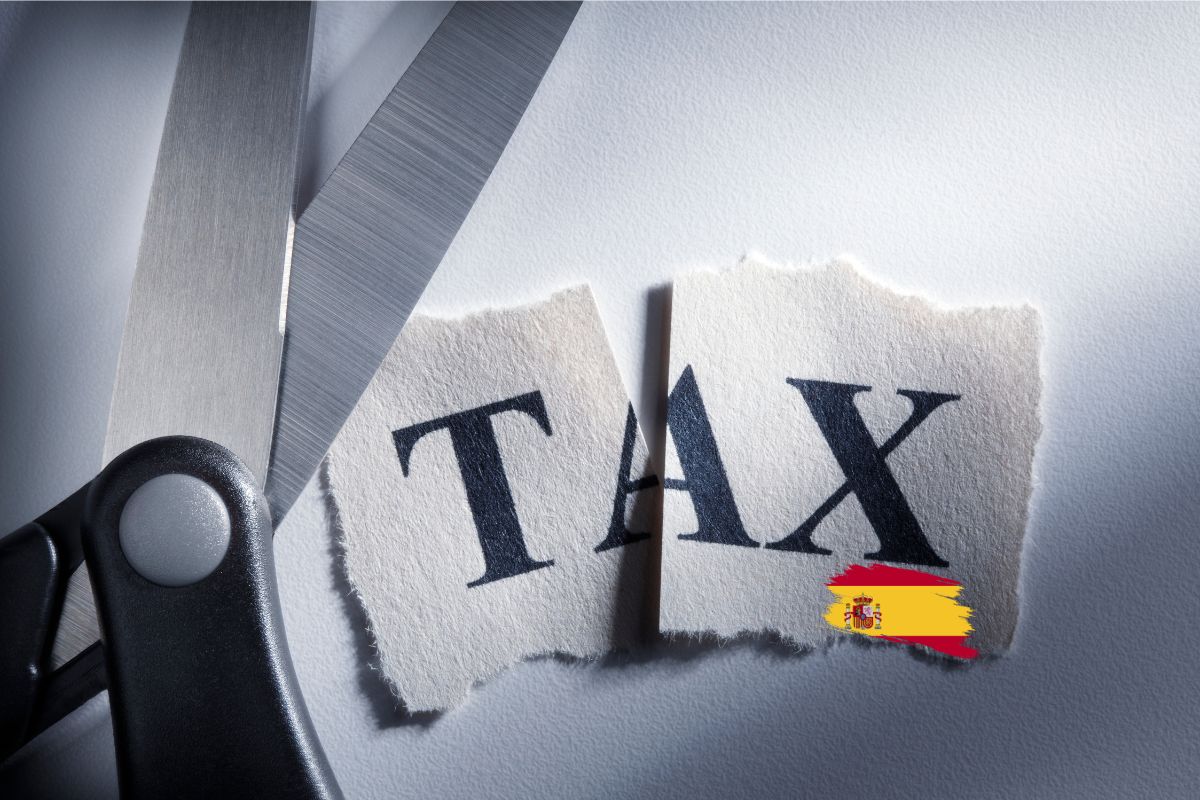
If no money is withdrawn from the bond, no tax is payable whereas the interest on the deposit account will continue to be taxed.
If the bondholder moved back to the UK, and nothing had been withdrawn whilst living in Spain, any growth on the bond whilst resident in Spain would be ignored by the UK tax office.
As an added benefit of reducing taxable income, wealth tax can be reduced. See this Wealth Tax in Spain article.
There can also be inheritance tax benefits with the bond when compared to the deposit account.
Well managed portfolios have consistently outstripped inflation. Conversely, deposit interest rates offered to savers have consistently under-performed inflation over the years.
To find out how we can help you with your existing investments and tax planning, and provide you with ideas for the future, contact me today at john.hayward@spectrum-ifa.com or on +34 618 204 731 (WhatsApp)
* E&OE. The above is a simplified example for illustrative purposes and general guidance only.
How to reduce Wealth Tax in Spain
By John Hayward
This article is published on: 21st June 2023

Earlier this year, I wrote an article about the introduction of solidarity tax in Spain. This is a “temporary” (we shall see) tax on wealth for those with more than €3,000,000 in assets. This is in addition to wealth tax although any wealth tax due can be deducted from the solidarity tax bill. (This is not the case for residents of the Madrid or Andalusia regions as there is no Wealth Tax currently).
I have been working with clients who are affected by these taxes, trying to find ways of reducing the tax liability. Reducing wealth by gifting to, say, children is an option but that can create additional immediate tax problems. Also, for a number of different reasons, some clients are not willing to gift anything in their lifetime.
The amount of wealth Tax that has to be paid can be governed by income. Your income tax and wealth tax cannot exceed 60% of your total taxable income.
Example:
– Total taxable income is €40,000
– Tax payable €8,000
– Assets subject to wealth tax €3,000,000
– Wealth tax due €39,000
– The maximum that can be paid when adding income tax and wealth tax together is 60% of the total taxable income (€40,000).
– €40,000 x 60% = €24,000
Therefore, the maximum wealth tax that can be paid is €16,000 (€24,000 less €8,000 income tax).
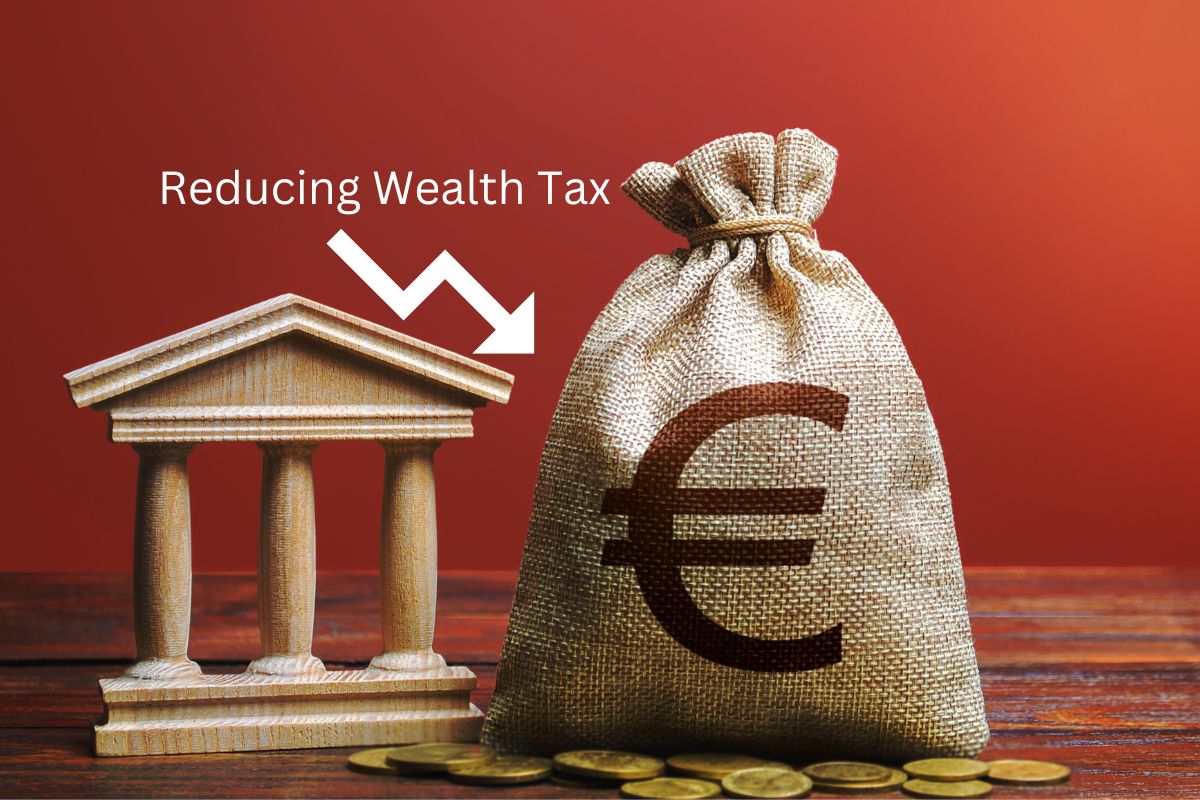
However, having to pay €16,000 a year in wealth tax is still not particularly nice. What we can do is look at the income in order to see if this can be restructured. Notable targets for this type of planning are savings interest (more relevant at the moment) and income/dividends from shares and investment funds. By careful planning, we can provide the same level of income yet reduce the tax. Please visit this Tax Benefits of a Bond page which illustrates one of the major benefits of a correctly structured investment bond which not only reduces income tax but also helps to reduce wealth tax.
To find out how we can help you with your existing investments, pensions, and tax planning, and provide you with ideas for the future, contact me today at john.hayward@spectrum-ifa.com or on +34 618 204 731 (WhatsApp)
Am I paying too much Wealth Tax in Spain?
By John Hayward
This article is published on: 21st February 2023
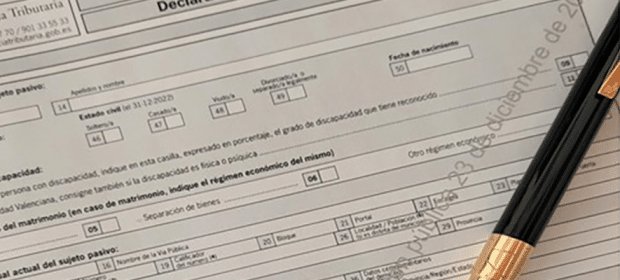
Just when you thought that it was safe to win the lottery in Andalusia or Madrid, the socialist Spanish government have introduced a new
temporary Solidarity Tax.
According to Investopedia, a solidarity tax is a government-imposed tax that is levied in an attempt to provide funding towards theoretically unifying (or solidifying) projects. In other words, it is a tax on the wealthy to provide funds for the not so wealthy. Other regions still have Wealth Tax with varying allowances and this will continue without the risk of having to pay two taxes. That said, taxes are rarely straightforward and I am confident that there will be issues in the future which will result in the Spanish tax office tweaking things. It is interesting, if not extremely concerning, that Wealth Tax was introduced on a temporary basis as well. It has been around for the last 11 years. So, not really temporary in my opinion.
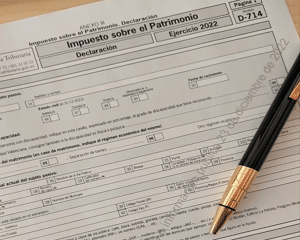
We are in Modelo 720 season at the time of writing, with overseas assets having to be declared by 31st March. Although not a tax declaration, the Modelo 720 naturally leads on to Wealth Tax. One of the asset types to declare is property.
In Spain, the tax office can reference the Cadastre to establish a property value. However, they do not have access to the land registry in, say, the UK. Therefore, the only price that is in writing is the purchase price. It is this value that should be entered on the Modelo 720 and subsequently be liable, or not, for Wealth Tax. My suspicion is that people have declared what they believe to be the market value and are possibly paying too much in Wealth Tax as a consequence.

By redistributing wealth and utilising the allowances, and applying the 60% rule (contact me for more information), it is possible to reduce Wealth Tax (and/or Solidarity Tax) or even eliminate it completely.
We can introduce you to investment products that are not only tax efficient in Spain in terms of income tax but can help to reduce Wealth Tax.
More Spanish residents to pay wealth tax
By John Hayward
This article is published on: 19th January 2023
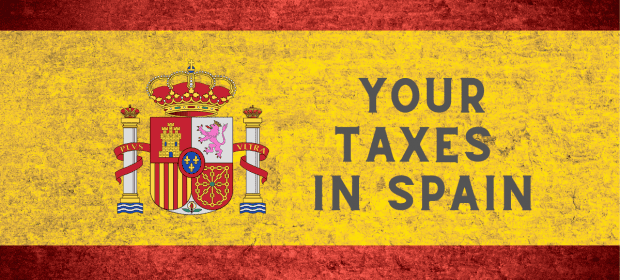
Valencia reduces allowance with more people having to pay
the Impuesto Sobre el Patrimonio
Further to my article from last week, and after consultation with our accountant associates, it appears that the main residence wealth tax allowance of up to €300,000 only applies after 3 years of living in the property (habitual residence). This has been questioned but, as is often the case in Spain, getting a response from the tax office can be tricky.
The tax office words that are relevant in terms of getting around this 3-year rule are “circumstances that necessarily require the change of housing”. Moving to Spain to retire or for a change of lifestyle would not generally tick that box. If there are justifiable health reasons or similar then that appears to be acceptable in terms of applying the allowance.
To emphasise the habitual residence aspect, from JC & A Abogados in Marbella: “Please note that you must live effectively and consecutively in the property for more than 3 years, so you cannot rent the house out even for one day. In addition, you have to impute a benefit in kind for the Spanish property during the same 3 years period.”
In the words of JC & A, “The 3 year period starts counting from the purchase date as long as the dwelling is inhabited effectively and permanently within 12 months as from the purchase date.”
“…..a taxpayer who bought his main home but could not live in it because it was not suitable and had to have some works that exceeded 12 months; the conclusion is that the 3-year period starts counting from the date he moved in and not the purchase date.”
Adding salt to this potential tax wound, whilst it is not treated as your main residence (even though you live there permanently), you have to pay tax on its value as if you were a non-resident.
This all seems rather inequitable but is the law as things stand.
If you would like to discuss managing your money in these volatile and uncertain times, please do not hesitate to contact.
Visit John Hayward of The Spectrum IFA Group or complete the form below.
Financial updates in Spain
By Chris Burke
This article is published on: 23rd November 2022

This month we cover the following topics (if there is anything you would like to understand more or wish to see covered in these articles, don’t hesitate to ask):
- Digital Nomad Visa – Update
- New Wealth Tax Implemented for those with assets over €3 million
- New Autonomo payments from 2023
Digital Nomad Visa – Update
The Spanish Government has confirmed plans for its digital nomad visa scheme. The scheme will offer citizens from non-European Union countries the opportunity to live in Spain whilst working remotely for companies located outside the country.
The visas will be available for those who derive a maximum of 20 per cent of their income from Spanish firms and who work remotely for companies located outside Spain. The visas should bring vital help to the Spanish economic sector and that it will also help the country recover from the economic damages caused by the Covid pandemic.
Even though there has been no detailed information publicly and the law has not yet been 100% passed through Parliament, it has been publicised that the visas will be initially granted for a period of one year. There will then be the opportunity for this period to be renewed for more than five years, depending on the circumstance of the applicant.
Spain’s Economic Affairs Minister, Nadia Calviño, stressed that “the digital nomad visa will attract and retain international and national talents by helping remote workers and digital nomads set up in Spain.”
In order to benefit from Spain’s digital nomad visa, applicants must be able to show or prove that they have been working remotely for at least a year and be from outside the European Economic Area. They must also show that they hold a contract of employment or, if freelance, prove that they have been regularly employed by a company outside of Spain. Proof that they have enough money to be self-sufficient and have an address in Spain is needed too.
Spain is not the first country in Europe to instigate a Digital Nomad Visa programme. Estonia, Croatia, Portugal and Iceland already have a similar visa scheme, and in January this year the Government of Romania implemented a similar visa.
New Wealth Tax Implemented for those with assets over €3 million
Spain is set to implement a new wealth tax, its second, as the country looks for ways to raise funding to pay for social policies amid soaring inflation.
As reported by Bloomberg, those who have assets worth at least €3 million ($2.9 million) a year from 2023 will be affected, the Budget Ministry said in late September. Payments made against an existing wealth tax will be deductible from the new one, it said.
There are three ranges to the tax:
| Assets | Tax (Payable Yearly) |
|---|---|
| Between €3 and €5 million | 1.70% payable on the value of the assets |
| Between €5 and €10 million | 2.10% payable on the value of the assets |
| Over €10 million | 3.50% payable on the value of the assets |
23,000 people will be affected by the new tax and is expected to raise around 1.5 billion Euros. In 2024 another 204 million is expected to be raised by an increase of up to 2 percentage points on incomes above 200,000 Euros a year. There will be tax reductions for lower earners which is estimated to be worth about €1.88 billion over two years.
New Autonomo Payments from 2023
Self-employed workers (Autonomo’s) in Spain will start paying new monthly social security fees which will be based on the amount they earn. The changes will be brought into force from January 2023.
For those newly self-employed and under the age of 35:
| Time Period | Amount Payable |
|---|---|
| The first 12 months | €60 (80% reduction) |
| Month 13 – Month 18 | €146.97 (50% reduction) |
| Month 19 – Month 24 | €205.76 (30% reduction) |
This flat rate is a measure to promote self-employment that consists of paying a reduced monthly Social Security contribution as a self-employed person for two years.
For those who have been self-employed for two years or more:
| Amount earned per month (€) | 2023 | 2024 | 2025 | 2026 |
|---|---|---|---|---|
| < 600 | €281,50 | €269,30 | €257,00 | €244,80 |
| 600 – 900 | €281,50 | €269,30 | €257,00 | €244,80 |
| 900 – 1.125,90 | €293,90 | €293,90 | €293,90 | €293,90 |
| 1.25,90 – 1.300 | €351,90 | €351,90 | €351,90 | €351,90 |
| 1.300 – 1.500 | €351,90 | €413,10 | €413,10 | €413,10 |
| 1.500 – 1.700 | €351,90 | €413,10 | €474,30 | €474,30 |
| 1.700 – 1.900 | €351,90 | €413,10 | €474,30 | €535,50 |
| 1.900 – 2.330 | €351,90 | €413,10 | €474,30 | €535,50 |
| 2.330 – 2.760 | €351,90 | €413,10 | €474,30 | €535,50 |
| 2.760 – 3.190 | €351,90 | €413,10 | €474,30 | €535,50 |
| 3.190 – 3.620 | €351,90 | €413,10 | €474,30 | €535,50 |
| 3.620 – 4.050 | €351,90 | €413,10 | €474,30 | €535,50 |
| >4.050 | €351,90 | €413,10 | €474,30 | €535,50 |
*Source: Government of Spain
In summary, the current minimum fixed payment of €294 will be changed to a progressive system of 13 instalments, depending on income. This will be introduced over 9 years. It’s important to note that these changes have not yet been finalised and there are still some details to be agreed.
If you would like any more information regarding any of the above, or to talk through your situation initially and receive expert, factual based advice, don’t hesitate to get in touch. You can book an initial consultation via my calendar link below or email/send me a message.
Moving to Spain and Wealth Tax
By Charles Hutchinson
This article is published on: 6th October 2022

I was flying back home from London at the weekend and I was sitting beside a fellow Brit who seemed very pleasant. We got chatting and it turned out he is a keen golfer, lover of warm climes and owns a holiday home in Southern Spain. His wife is a keen gardener. We exchanged pleasantries and he felt frustrated he could not move himself and his wife permanently to Spain. I asked why not? He replied the tax situation in Spain is horrendous from every angle and they have something called Wealth Tax which is unheard of in many countries, including the UK. As a wealthy man, this put it out of the question. He said he had missed the boat regarding a Residencia (TIE) and found queuing for miles at Malaga airport with all the other Brits on returning to the UK from Spain was really unacceptable.
We had over an hour more together on the flight and he was my captive audience. So I proceeded to give him the lowdown on the whole tax situation:
1. Wealth Tax (suspended). From last week, there is no more Wealth Tax for residents and non residents of Andalucia where my companion’s house is located. What or where is Andalucia? Andalucia is a semi autonomous region (one of 17 in Spain) which stretches from the Portuguese border in the West to beyond Almeria in the East and up to Cordoba in the North and is bordered to the South by the beautiful Mediterranean Sea. Its capital is the stunning Seville. Wealth Tax was calculated on the total value of your assets on a varying sliding scale according to the amount. At the upper level it was 2.76% on €10.696m and above. Previously as a resident, you had to pay wealth tax on ALL your worldwide assets. As a non resident, it was only on your Spanish assets.
As a result of the suspension, it is expected that many previously resident expatriates will return from those countries with attractive tax regimes to Andalucia as residents and many first time residents will apply to become permanent residents.
Additionally, the case (tax wise) for coming to live here, these other taxes are just SO friendly:
2. Spanish Succession Tax (IHT) (suspended). This was effectively abolished on 1st January 2018 by granting a 100% allowance on the first €1m and thereafter 99% allowance. Assets sheltered in foreign entities (banks, insurance companies, etc.) which are being inherited by foreign residents (e.g. children living outside of Spain) are also exempt from this IHT.
3. Capital Gains Tax (adjusted). Payable at the same rates by everyone except on the sale of your main residence in Andalucia where it is exempt if you are over age 65.
4. Income Tax (decrease). A decrease by at least 4% p.a. has been announced. On investment income derived from approved EU based Spanish Compliant Investment Bonds, this attracts very low income (savings) tax. We are talking about a drop from a standard income tax upper level rate of around 46% down to a level of between 9% and 11% average over a 20 year period, depending on the amount of income taken.
5. Water consumption tax (suspended). This is planned to be abolished from 2023. So my companion with the big garden and pool was pleased.
6. Residencias. If you hold a TIE (Tarjeta Individual Extranjero), you can stay in Spain up to 6 months, if you are a non taxpayer in Spain. As a taxpayer in Spain, you can stay for an unlimited period. One of the benefits is that in both cases you can join the queue for Nationals and EU citizens with your British passport and TIE – no more queuing! You can also roam the EU Schengen area at will and stay as long as you like (the latter if your TIE is a “Permanente”) within the residency rules of those countries.
Although the application window for TIEs for Brits has closed, you can still apply for a Golden Visa (investor’s visa), come and go as you please but become a tax resident of Spain if you stay more than 183 days. Or you can apply for a non lucrative Visa which allows you to stay as long as you want but you cannot be employed and you have to become a tax resident.
7. Tax residency. What exactly does it mean? Simply put, if you spend more than 183 days in 12 months in Spain, then you must file for tax residency. If your “centre of vital interests” is in Spain (wife or partner here, children in school here, etc.), then you would be judged to be fiscally resident.
At the end of my lengthy discourse, he asked what exactly would this mean for him? So on the back of an inflight magazine, I jotted down some information from him and gave him an approximate potential tax position and the savings he would now have, in addition to some existing ones of which he was not aware.
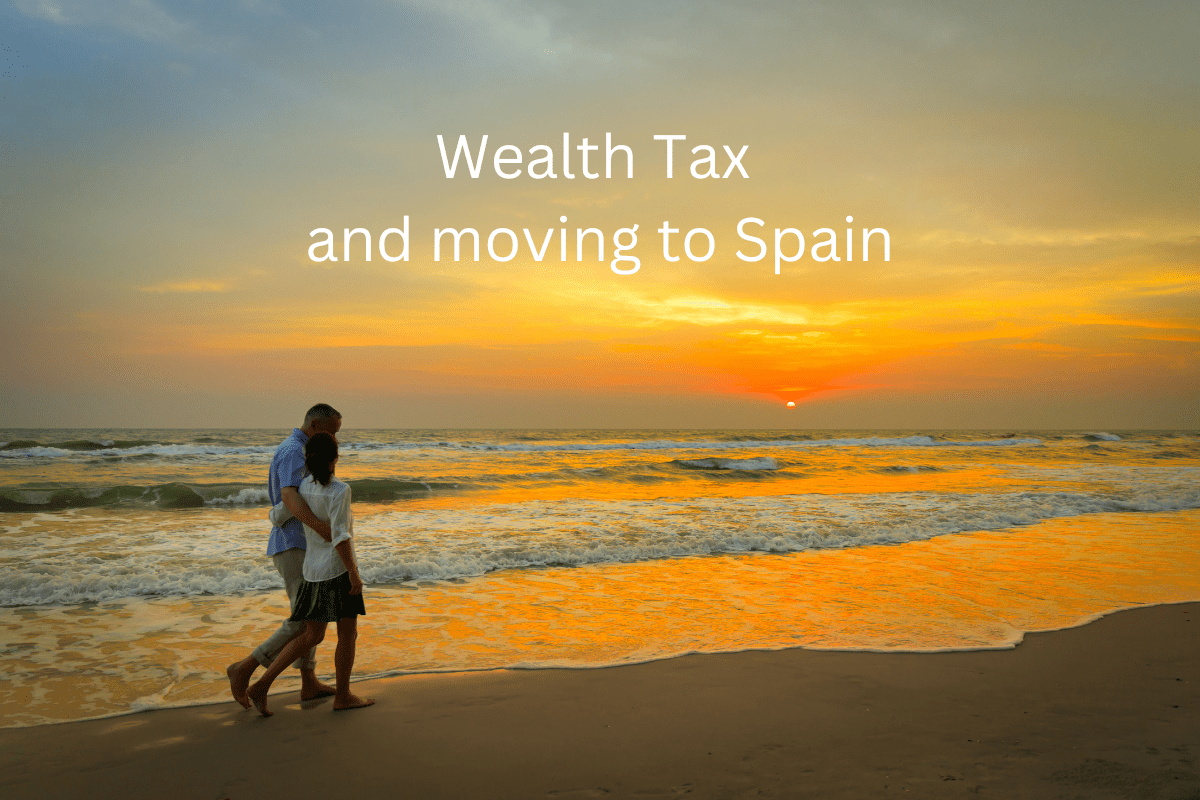
His total assets in the UK and Spain, including homes, bank accounts, premium bonds, managed investment portfolio and a classic car totalled some €5,526,000. On this as a Spanish resident he would previously have to pay some €98,000 in Wealth Tax. Now it would be zero.
On his pension and investment income of some €166,000, they would pay some €61,000 Spanish Income Tax. But by moving his investment portfolio into a tax efficient Spanish Compliant Bond (based outside of Spain), they could increase the investment part of their income to around a yield of approximately 5% p.a. while lowering their tax bill by some €10,000 p.a. (from €13,900 on their investment income to €3,900).
Of course, he would have to pay Capital Gains Tax on the move from his UK portfolio to the Spanish bond. This would probably be minimal while the markets are currently down. In any event their investment manager had “bed and breakfasted” * their portfolio two years earlier, thus further reducing the potential gain.
And there would be no Inheritance Tax payable by their three children, even if they decided to move to Spain also.
The best part to him seemed to be that his wife could water their garden for as long as she liked!
There was a noticeable spring in his step when my companion left the aircraft in Malaga. I had one too as I felt I had probably gained a new client.
* Bed and Breakfast. This is where you take advantage of the annual UK CGT allowance by selling some or all of your holdings and then buying them back, both just before the end of the tax year. This prevents a large Capital Gain build up over the long term.
Somewhere in this article there must be such good news that you want to know more. Why don’t we discuss it over a coffee? And of course, I don’t mind what they say about Italian coffee, I think the coffee in Spain is the best there is anywhere in the world! It’s the way they make it and serve it. Rather like how we look after our clients.
No more wealth tax in Andalucia
By Charles Hutchinson
This article is published on: 21st September 2022

THIS NEWS IS SO GOOD, WE’RE TELLING YOU
ABOUT IT FOR A SECOND TIME!
Yes, you heard us right, Wealth Tax in Andalucia has been abolished.
The Government in Andalucía is in the process of approving today a 100% allowance for the Wealth Tax liability, as announced by Juanma Moreno, the President of the Junta yesterday, which means in practice the elimination of this tax in the region.
The measure will be effective from Wednesday 21st September 2022 , applicable to Residents in Andalucía and Non-Residents who are liable to Wealth Tax for assets located in this region.
Ten of the top 20 wealth tax payers in 2019 left Andalucia in 2020, resulting in a loss of income for the region of nearly 18 million Euros (3.5 m in wealth tax and 14m in personal income tax). Moreno said he wants people who spend long periods here to make it their permanent home and pay tax here. He estimates it will attract 7,000 new residents which will more than make up the loss of previous revenues.
The Conservative Party, following the tax policy of Madrid where the Wealth Tax was eliminated years ago, has put Andalucía on top of the list of the most attractive locations to live or invest in Spain in terms of taxes, along with other previous decisions taken to practically eliminate the inheritance and gift tax for close relatives, or the reduced transfer tax flat rate of 7% approved in 2021. He also announced a reduction in Income Tax by at least 4%.
Moreno also announced that water consumption tax in the autonomous region will be suspended in 2023.
This measure will boost the Region by removing one of the main barriers for foreigners moving to Spain permanently, or just to buy luxury properties in their personal name, but also attracting those living in other less favourable regions in Spain.
A very welcome and largely demanded decision. If you are planning to move to Andalucia or have delayed doing so until now, please contact me to discuss this important step taken by the regional government and how it could change your and your family’s life style for the better into the future.
At Last, Wealth Tax is abolished in Andalucia
By Jeremy Ferguson
This article is published on: 21st September 2022

Monday the 19th of September 2022 will be in the history books forever. Having watched the coverage of the Queens funeral on TV, it made me think there is no other country on earth who could have put on such an impressive show for the world to see. It made me feel very proud to be British.
Moving overseas is an exciting and daunting thing to do but if you, like me, have lived overseas for many years, that homesick feeling does hit home sometimes, and the Queens funeral was certainly one such example.
It has been a tough year in many ways. Everything it seems is changing. The reopening from the pandemic has changed the way many people work. Russia’s Invasion of the Ukraine changed the idea of a peaceful Europe. The cost of living has increased due to rising inflation, and now rising interest rates are back with us. All of this has happened after years of peace, cheap energy, low interest rates and non-existent inflation. It seems the longer we live with something, the more powerful it’s passing, something that no doubt made the Queens funeral very emotional for many people.
We now have a King, and the world in which we live is without doubt going to continue to change. Any of you filling up your car will have noticed the cost has come down from the previous highs in the summer, and the general consensus is that inflation will start to slowly come down between now and the end of the year. It isn’t however expected to hit the floor, but rather fall to a much more acceptable level.
When you are retired and keeping a close eye on your savings, investments and pensions, inflation and interest rates are two critical factors to take into account when trying to work out the future. If you have a fixed pension income, it is commonplace to then substitute this with ‘income’ from investments, the spending power of which is affected by inflation. If the investment returns are all over the place, and inflation is doing the same, it’s really important to monitor things closely and on a regular basis. As an example, if things carry on as they are, we may see a return of interest on bank deposits, which has been a factor not taken into account for a long time when making plans for your money.
Tax is something I’ve not really mentioned before, but this of course has an effect on your disposable income. Pension and Investment income can be very tax efficient here if the right planning is taken, but something that has always been a difficult one to deal with is the annual Wealth Tax.
In the past many Wealthy individuals have decided against moving to Andalucia because of the punitive Wealth tax, which in real terms doesn’t actually generate that much revenue each year (estimated at €95m per annum for the Region). It is felt that by attracting more Wealthy Individuals, the increased expenditure and resultant revenues will far exceed that amount, so it does seem to make perfect sense.
Financial planning in retirement isn’t rocket science, but with so many variables effecting how things may look financially going forward, it’s never been more important to make sure your previous plans aren’t sitting gathering dust. Maybe they are not being best suited for the new environment we find ourselves in.
The news has been very negative so far this year, and although the passing of the Queen was a very sad event, it marks a line in history and just goes to show nothing lasts forever. It will be interesting to see how the new King makes his mark in history.
If you would like to find out more about how we help our clients here in Spain, please feel free to get in touch.
Wealth Tax in Catalonia
By Chris Burke
This article is published on: 7th April 2022

How to reduce it and know how it works
Catalonia is a great place to live for so many reasons. However, like the majority of places in the world, there are taxes to pay too. Although nobody likes to pay taxes, there is a societal need for them. They help fund the public health system, providing care for our families and for ourselves in later life, schools, so our children can receive a formal education and roads, so we can safely and effectively travel. However, in spite of this there are ways in which we can organise our taxes in an efficient manner to ensure that we are paying no more than the amount that we need to pay.
The Wealth Tax (known as ‘El Impuesto de Patrimonio’ in Spanish) is an example of a tax which is an additional tax in Catalonia that many people deem to perhaps be unfair. I mean, why should you pay tax just because you have done well in life, or your parents have and passed this wealth onto you? In summary, it is a tax that you pay on your net wealth (assets owned minus liabilities). The tax is paid on the assets that you hold which fall over a certain threshold. The threshold in Catalonia is €500,000 whilst the threshold throughout the rest of Spain is €700,000. There is a €300,000 exemption for your main residence, meaning that you will not pay tax on your main residence if it is valued under this amount. If your main residence is worth more, you can deduct €300,000 from the valuation and you will only be liable to wealth tax on the excess amount.
Here is a list of the assets that are and aren’t liable to Wealth Tax in Catalonia:
| Assets that Wealth Tax is applicable to |
Assets that Wealth Tax is not applicable to |
| Real estate | Household contents (except for Art) |
| Savings | Shareholdings in family companies |
| Shares | Commercial Assets |
| Cars | Intellectual Property and Pension Rights |
| Boats | |
| Jewellery | |
| Art |
Source: Balcell’s Group
The rate of wealth tax depends on the amount by which you are over the threshold. The general rule is that it ranges from 0.20% to 2.50% in Spain. However, in Catalonia the rate is slightly higher, ranging from 0.21% to 2.75%. You are required to declare your wealth as part of your annual declaration (in Spanish, ‘Declaración de la Renta’) on form 714 at the end of the calendar year, making any payment by 30th June the following year. The below tables display the Wealth Tax rates for Spain as a whole and the variation of the wealth tax to pay depending on the autonomous community (Communidad Autonomo) in which you reside. However, this is an overview to what is a complex calculation, so if you require personalised information, please get in contact with Chris.
| Settlement basis up to (euros) | Fee (Euros) | Other net base up to (euros) | Applicable Rate % |
| 0.00 | 0.00 | 167,129.45 | 0.20% |
| 167,129.45 | 334.26 | 167,123.43 | 0.30% |
| 334,252.88 | 835.63 | 334,246.87 | 0.50% |
| 668,499.75 | 2,506.86 | 668,499.76 | 0.90% |
| 1,336,999.51 | 8,523.36 | 1,336,999.50 | 1.30% |
| 2,673,999.01 | 25,904.35 | 2,673,999.02 | 1.70% |
| 5,347,998.03 | 71,362.33 | 5,347,998.03 | 2.10% |
| 10,695,996.06 | 183,670.29 | Thereafter | 2.50% |
Source: Balcell’s Group
| Autonomous Community | Wealth Tax % Variation |
| Catalonia | Between 0.21% and 2.75% |
| Asturias | Between 0.22% and 3% |
| Region of Murcia | Between 0.24% and 3% |
| Adalusia | Between 0.24% and 3.03% |
| Community of Valencia | Between 0.25% and 3.12% |
| Balearics | Between 0.28% and 3.45% |
| Extremadura | Between 0.30% and 3.75% |
Source: Balcell’s Group
There are ways in which you can mitigate the wealth tax you are required to pay, as noted in the above table, some assets are exempt. Therefore, if you transfer your wealth into these assets then they will not be included as part of your wealth tax calculation. For example, you may not be liable to wealth tax on assets that you transfer to shareholdings in family businesses or certain household or commercial assets.
However, this is not a straightforward process and certain criteria must be met. For example, if you transfer your capital to a ‘family business’, then there are strict regulations on what constitutes a family business, which assets qualify and how you do this. And if you were to utilise your capital to purchase household contents, certain items such as art are not exempt.
Another way to mitigate wealth tax is by relocating. There are a few countries in Europe in which you would not have to pay the wealth tax such as Sweden, Luxembourg, Denmark, Germany and Austria or France. In the UK, they are considering implementing a wealth tax. If you prefer to stay in Spain, then residents of Madrid are exempt from wealth tax so it may be beneficial relocating there.

Finally, you can effectively double your wealth tax exemption threshold by getting married! The wealth tax exemption threshold will then be increased as everyone person is entitled to it. This also counts for the main residence allowance; therefore you may not be liable on wealth tax on your main residence up to €600,000.
Being efficient with your monies/assets from a tax perspective is almost as important as making your money grow. If you would like to seek specialist advice, Chris Burke is able to review your pensions, investments and other assets and evaluate your current tax liabilities, with the potential to make them more tax effective moving forward. If you would like to find out more or to talk through your situation and receive expert, factual advice, don’t hesitate to get in touch with Chris via the form below, or make a direct virtual appointment here.
Disclaimer: Spectrum IFA do not provide tax, legal or accounting advice. This material has been prepared for informational purposes only, and is not intended to provide, and should not be relied on for, tax, legal or accounting advice. You should consult your own tax, legal and accounting advisors before engaging in any transaction.
French Tax declarations in June – Trusts & Wealth Tax
By Katriona Murray-Platon
This article is published on: 1st June 2021

Oh what a month of May! So despite the old adage of being able to do as we please, the weather clearly didn’t get the memo! May has been a whirlwind of enquiries and questions on taxes with lots of people requesting the Spectrum Tax Guide. Hopefully, by now most of you have filed your tax returns, but those living in department numbers 55 to 976 as at 1st January, still have a few more days, until 8th June to file theirs. Also, if you have appointed an accountant to do your tax return, they have a special extended deadline until the end of June to file all remaining returns.
If you had a go at your own tax return, but would prefer to hand it over to a professional either for future returns or to check that what you filed this year was correct, it would be best to try to contact them after the end of June. If you think you made a mistake on your tax return, you have until the end of the year to correct it. You will soon know if there is something not quite right with what you have declared when you receive your statement at the end of August/beginning of September. At that point, if you are quick you can submit an amended return before the payment deadline; otherwise you may have to pay the tax payable on the original statement whilst awaiting the amended return to be processed and a new tax statement to be issued, with any tax reductions if applicable.

This month, my family and I set off for our first mini-break since the lockdown in March last year. I have to say we were a bit nervous venturing out of our house, preparing the suitcases and worrying that we hadn’t forgotten anything. We stayed in the lovely village of Coux-et-Bigaroque, about 45 minutes east of Bergerac. In spite of the weather we were able to take the children to the Perigord Aquarium, the Caves of Grand Roc and the Chateau of Milande, formerly owned by the singer and entertainer Josephine Baker. Whilst I love visiting this chateau and the birds of prey show in the grounds, it always makes me feel a bit sad. It is an example of how someone with such talent and a kind heart didn’t have the right advisers to help her make the best financial decisions.
In June there is another tax deadline that still needs to be considered:
Which is that all Trust declarations need to be declared by 15th June. I wrote an article many years ago which you can find HERE
There have been no significant changes to the treatment of trusts since the law of wealth tax was amended to include only immovable property. A trust can be recognised in France and perfectly valid in France provided that it doesn’t go against public policy (ordre public) and in particular the rights of heirs under French law. Income from a trust is subject to income tax depending on the nature of the income (rent from an apartment or capital income) and can be subject to tax credits under a double tax convention. Trusts (excluding charity trusts and pension trusts) must be declared in France if any of the settlor, trustee or beneficiary are French residents or if the trust contains an asset situated in France on 1st January. According to a press release by the Ministry of Finance on 5 July 2016, 16,000 entities had been identified and notified as trusts to the French administration.
Another change this year is that the Wealth Tax declaration which normally had to be submitted by middle of June if you have assets over a value of €1,3million, this year has to be submitted at the same time as your tax returns by way of a tax form called 2042-IFI. Those of you resident in departments numbered 55 and above still have until 8th June to submit. If you French tax residents who came to live in France, after having spent 5 years abroad, you are not taxable on your non-French assets until 5 years after you became resident. Non-residents also have to declare if their French assets are over €1.3million.



